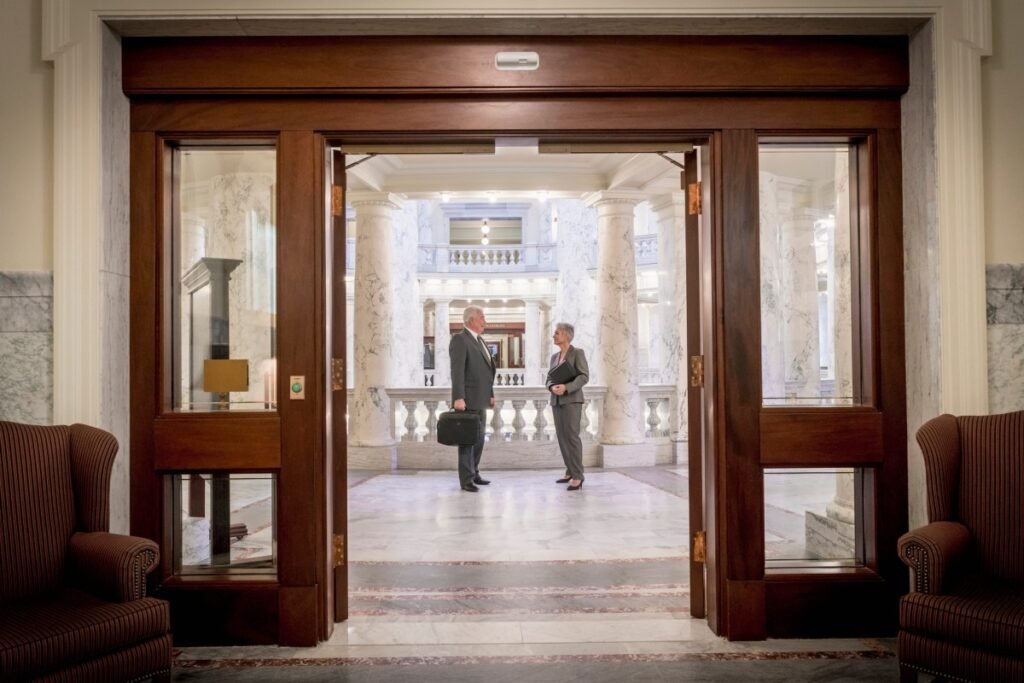When OpenAI was having its ChatGPT moment in 2022, Joe Scheidler, co-founder and CEO of Helios, was tackling a different kind of challenge: Helping build the White House’s newly authorized cybersecurity office and navigating the complexities of public-private coordination on cyber policies.
His current co-founder, Joseph Farsakh, was also at the State Department, working on Yemen Houthi peace negotiations. The two overlapped in national security discussions and started trading notes on how large language models might transform public policy on a day-to-day level.
On the level the White House operates, critical decisions are often made using a patchwork of tools, spreadsheets, and institutional memory. The founders thought: What if there was a better way to support decision making, one that combined AI-native tools with an understanding of how public policy is decided?
The answer to that question was the idea behind Helios. To make it real, the co-founders brought on Brandon Smith, a long-time acquaintance of Scheidler’s and a machine learning veteran who had worked at Microsoft and Datadog, to lead the technical vision.
“Our unfair advantage is bringing a super unique blend of domain expertise, contacts, and technical expertise to a really important problem,” Scheidler told TechCrunch.
Helios (not to be confused with the payroll/HR management solution, or the climate/economic forecasting product of the same name) emerged from stealth last month with $4 million in seed funding. The round was led by Unusual Ventures, with participation from Founders Inc. and Alumni Ventures, TechCrunch has exclusively learned.
Helios’ flagship product is Proxi, an AI-based operating system built for public policy, regulatory affairs, legal, compliance, and government teams, is still in beta. But, Scheidler says, the company is already seeing early traction with workers in federal, state, and local agencies, as well as Fortune 500 companies and startups.
“We wanted to empower all public policy, legal and compliance professionals with end-to-end automation, deploying sort of a web of secure AI agents that are trained and fine-tuned against really robust public policy data sets to support them on anything from strategic advisement to very sensitive and complex writing products, data analysis and stakeholder mapping,” he said.
Proxi has four core features. The first is dubbed “Consult,” and Scheidler describes it as a “conversational AI agent, your 24/7, always-on public policy team member who is constantly scanning the legislative and regulatory environment.”
Before they begin, customers tell Proxi about themselves, their work, their portfolio, their focus and objectives. The agents then surface key information to the user every time they log on.
In a way, Consult is similar to another software platform by Hence, which uses AI to help organizations monitor geopolitical and business risk.
Proxi’s second feature is called “Scribe.” This is a collaborative AI editing and writing tool that helps policy professionals turn their soundboarding sessions with Consult into memos, filings and policy documents. Then there’s “Decipher,” a large-scale data analysis tool that helps users parse long-form bills, reports and filings, and turn them into structured insights and risk alerts.
“That’s a lot of what I spent my time doing at the State Department when I would have far preferred to just be on the Hill, building relationships with people who are actually making draft amendments and provisions,” Scheidler said.
Finally, Proxi offers a CRM (customer relationship management) tool that helps people visually map out their stakeholder environment and track their interaction history, including meeting notes.
It’s an all-in-one offering, Scheidler said, noting that Helios uses top encryption standards for federal clients, and is currently working through compliance audits.
Helios plans to use the seed funding to flesh out its product and engineering team, with a focus on finding the right tech talent.
Rather than rushing to monetize quickly, Scheidler says the startup is focusing on building long-term business relationships and collecting meticulous feedback from early beta users. “Our goal in five to seven years from now is for Helios to be completely synonymous with all government public and private interaction,” he added.
That may mean barrelling past short-term competition like Bloomberg Government and Fiscal Note Forum to challenge longer-term rivals like Palantir, OpenGov and Civica, the co-founder said.
“Palantir just surpassed a $300 billion market cap,” Scheidler said. “We think there’s a lot of room to play in this space over time.”
Read the full article here
